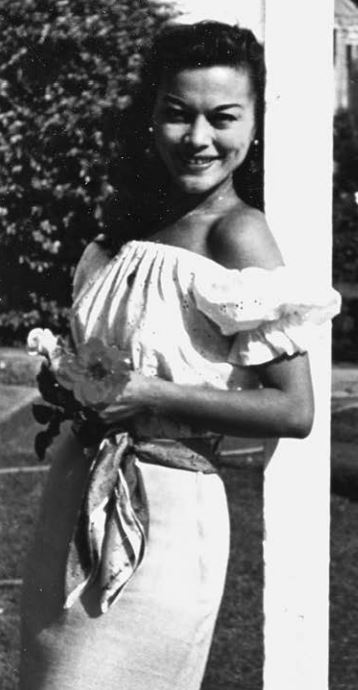New book: The love story between Gen. Douglas MacArthur and vaudeville actress Isabel Rosario Cooper

“Empire’s Mistress, Starring Isabel Rosario Cooper” tells the life of a Filipina actress and her five-year romance with a venerated war hero. The author, Vernadette Vicuña Gonzalez, follows the mestiza beauty from the Philippines to Washington, D.C. to Hollywood, where she died penniless. Cooper is depicted not as a tragic heroine, but as someone caught within the violent histories of U.S. imperialism. Below is an interview with author Vernadette Vicuña Gonzalez, who is professor of American Studies at the University of Hawai‘i at Mānoa. The book was published by Duke University Press.
What made you want to tell the story of Isabel Rosario Cooper?
When I started to dig into the footnotes of MacArthur biographies, I discovered a kind of recursive pattern that boiled down to a reliance on repeated citations of sources that had somehow become authoritative evidence for her story. What became clear was that these sources that were more hearsay or even outright inaccurate had circulated enough times that they had hardened into truth—in particular the version that revolved around the General as her object of yearning and heartbreak had become the standard.
There’s also a way in which stories like hers are dismissed as unworthy in the sense that her biggest known “accomplishment” is sleeping with MacArthur—often read as betrayal at worst, or venal at most—another way to marginalize women’s stories. I wanted to tell her story more fully because it deserved to be told with the same kind of effort in terms of research and writing as stories of men like MacArthur.
You choose not to structure your book chronologically like a traditional biography. Instead you begin with her relationship with MacArthur and then jump around in time. Why did you choose this structure?
I began with her death, because so much of what is written about her pivots on the suicide of this beautiful woman, and the half-truths or outright lies that adhered to it. I also foregrounded her time with MacArthur in the narrative, a bit perversely, because I wanted to arrest the desire to center MacArthur and frame him as the “reveal” of the story later on in the book. I felt like the strange enticement of that infamous scandal was not something I wanted the reader to be invested in. The few years of her life during which she associated with MacArthur has come to define her and how she’s narrated: it’s the hook that draws most people to her story, but I didn’t want it to operate as the climax of the narrative.

Cooper goes by many different names in her life, from Dimples as a child performer, to Chabing Cooper, Elizabeth Cooper, and Belle Cooper, to a married name of Isabel Kennamer. Why does Cooper constantly rename herself and shift her identity?
To me, this was a strategy that was tied to moments in her life where she was reinventing herself, or starting over. She was someone who had, at a very young age, entered the world of the stage and screen, so taking on roles was a habit she never dropped. It was something she also learned from her mother, to some extent. But she also had really distinct periods in her life: she crossed the Pacific several times, experienced very diverse living conditions, married twice, had affairs, and made big choices about her career. I think renaming herself gave her some modicum of control over conditions that were far beyond her power to manage, and later on, allowed for her to have a clean slate when so much of her past tended to creep up on her unexpectedly due to the lingering effects of U.S. imperialism.

You say that “sex, and lots of it, defined the colonial encounter.” How does focusing on intimate relationships like that of Cooper and MacArthur change the way we view colonial history?
I owe so much of this work to postcolonial feminists who understand the intimate as a site of colonial power, and to work by Philippine Studies and Filipinx diaspora studies scholars in particular who have explored how sex and sexuality operated in the U.S.-Philippine colonial world. My ability to tell Isabel Cooper’s story is built on that foundational research, and my claim is not new. What I try to shed a bit of light on is how the contradictions of American claims to benevolence and discourses of superiority break down when you look at how empire played out through relationships between people. So many of the colonial encounters turned on sex—the archives are filled with both overt confessions, allusions, or outright mentions of sexually transmitted diseases or decisions about the management of sex work. It’s dirty reading at times. I was interested in the messiness of transactions that revolved around sex or were defined through sexual exchange, as well as how the racial carnal desires at the heart of empire shaped relations well after the actual arrangement or encounter occurred. Who had the upper hand in these kinds of arrangements or coercions was not always clear, and that made for a fascinating dynamic to explore.
How have artists and people of Filipino descent remembered and reimagined Isabel Rosario Cooper? What does her legacy mean to people today?
For most Filipinos, Isabel Cooper first registers as MacArthur’s mistress, with all the titillation and scandal that entails. This is why interest around her endures. In so many ways, this bit of her story feeds into the melodramatic habits that characterizes some of Hollywood/Manila cinema of her time, as well the theater of everyday politics in the Filipino diaspora. She is also known to some extent as a performer on stage and screen. Filipino cinema is just a bit over a century old, so there has been renewed interest in its pioneers—and as a crossover vaudeville star who made a big early impression in the first “modern” Filipino silent films, Isabel Cooper (she went by Elizabeth Cooper in film) is noteworthy. I think she continues to attract this kind of interest because when you dig deep enough, there’s a lot more to her story beyond the superficiality of MacArthur’s mistress that is typically the first draw. I look to these interpretations as retellings that reveal the inadequacy of the “mistress” framework. My purpose in the book is not to supplant or supersede any of these creative encounters with her, but rather to shake up the assumptions that produce a particular narrative account that is a habit of imperial culture, and one that clearly is not enough to contain her.


© The FilAm 2021











